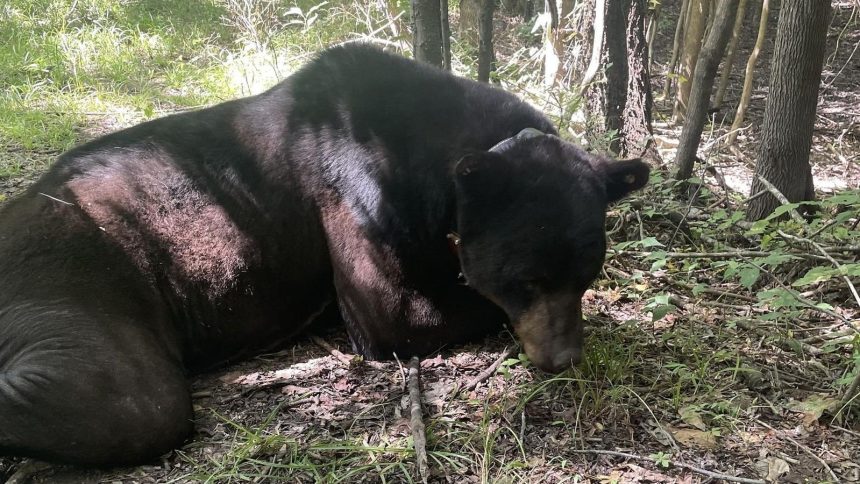A Mississippi Heavyweight: The Story of M18, the Record-Breaking Black Bear
The Mississippi Department of Wildlife, Fisheries, and Parks (MDWFP) celebrated a monumental discovery in the realm of wildlife conservation: a colossal 510-pound male black bear, affectionately dubbed M18, shattered the existing state record held by the MDWFP’s Black Bear Program. This "massive" bruin, as described by the researchers, easily surpassed the previous heavyweight champion, a 468-pound individual tragically found as roadkill. The discovery of M18 provides a beacon of hope for the resurgence of black bears in Mississippi, a species once on the brink of extirpation within the state.
M18’s capture offered a unique opportunity for researchers to study this magnificent creature up close. While the bear enjoyed a brief nap, the team fitted him with a GPS tracking collar, a crucial tool for understanding his movements, habitat usage, and overall contribution to the recovering black bear population. Photographs captured during the collaring process vividly illustrate M18’s impressive size in comparison to the adult humans working with him. This hands-on interaction allowed scientists to gather vital data, including weight and measurements, which contribute to a broader understanding of black bear biology and ecology in Mississippi.
The Black Bear Program, a collaborative effort between MDWFP and Mississippi State University, plays a pivotal role in monitoring and conserving black bears in the state. The program’s primary focus is tracking bears to gain insights into their movements, reproductive success, and population density. This information is crucial for informing conservation strategies and wildlife management decisions. The program’s long-term goal is to ensure the continued recovery and long-term viability of the black bear population in Mississippi. The data collected on M18 and other bears contributes significantly to this ongoing effort.
Black bears in Mississippi faced a dire situation in the early 20th century, their numbers plummeting due to overhunting and habitat loss. Classified as endangered within the state, their population dwindled to less than 50 individuals by the time the Black Bear Program was initiated in 2002. However, dedicated conservation efforts and improved habitat conditions have fostered a remarkable comeback. The current population is estimated to be three times larger than it was two decades ago, a testament to the program’s success. This resurgence is attributed largely to the recent influx of female bears into the state, leading to a surge in cub births, a phenomenon undocumented in Mississippi for the preceding 40 years.
M18’s story is particularly compelling as it is not his first encounter with the MDWFP team. In 2022, he was captured and collared when he weighed a comparatively modest 360 pounds. However, displaying a cunning not uncommon in these intelligent animals, M18 managed to shed his initial collar shortly after release. His recent recapture presented a valuable opportunity for researchers to not only gather updated data, but also to marvel at his remarkable growth. M18 exemplifies the resilience and adaptability of black bears, showcasing their ability to thrive in a changing environment.
Black bears, despite their name, exhibit a range of coat colors, from black and brown to cinnamon. Their omnivorous diet, encompassing fish, plants, nuts, fruit, insects, and even carrion, contributes to their adaptability and resilience across various ecosystems. While M18’s weight sets a new record for the Mississippi program, it does not represent the absolute upper limit for black bear size. Adult males typically weigh between 126 and 551 pounds, while females are generally smaller. Black bears are the smallest of the three bear species found in North America, dwarfed by their larger cousins, the brown bears and polar bears. Some brown bears, particularly those residing in Alaska’s Katmai National Park, can reach weights exceeding 1,200 pounds, highlighting the significant size variation within the bear family.
The Black Bear Program actively engages with Mississippi residents, encouraging them to report black bear sightings. This citizen science initiative contributes valuable data points to the program’s ongoing research, allowing researchers to track the expanding range of black bears within the state. M18 was found in Sharkey County, an area encompassing a significant portion of the Delta National Forest. The discovery of such a healthy, robust bear within this region serves as a positive indicator of the program’s effectiveness and the ongoing recovery of the black bear population.
The continued monitoring of M18 and other black bears in Mississippi is essential for the long-term success of the Black Bear Program. With a potential lifespan of up to 30 years, M18 may remain a prominent figure in the state’s bear population for years to come, potentially even surpassing his own record-breaking weight. His story serves as a symbol of hope for the future of black bears in Mississippi and underscores the importance of ongoing conservation efforts to ensure their continued survival and prosperity.



